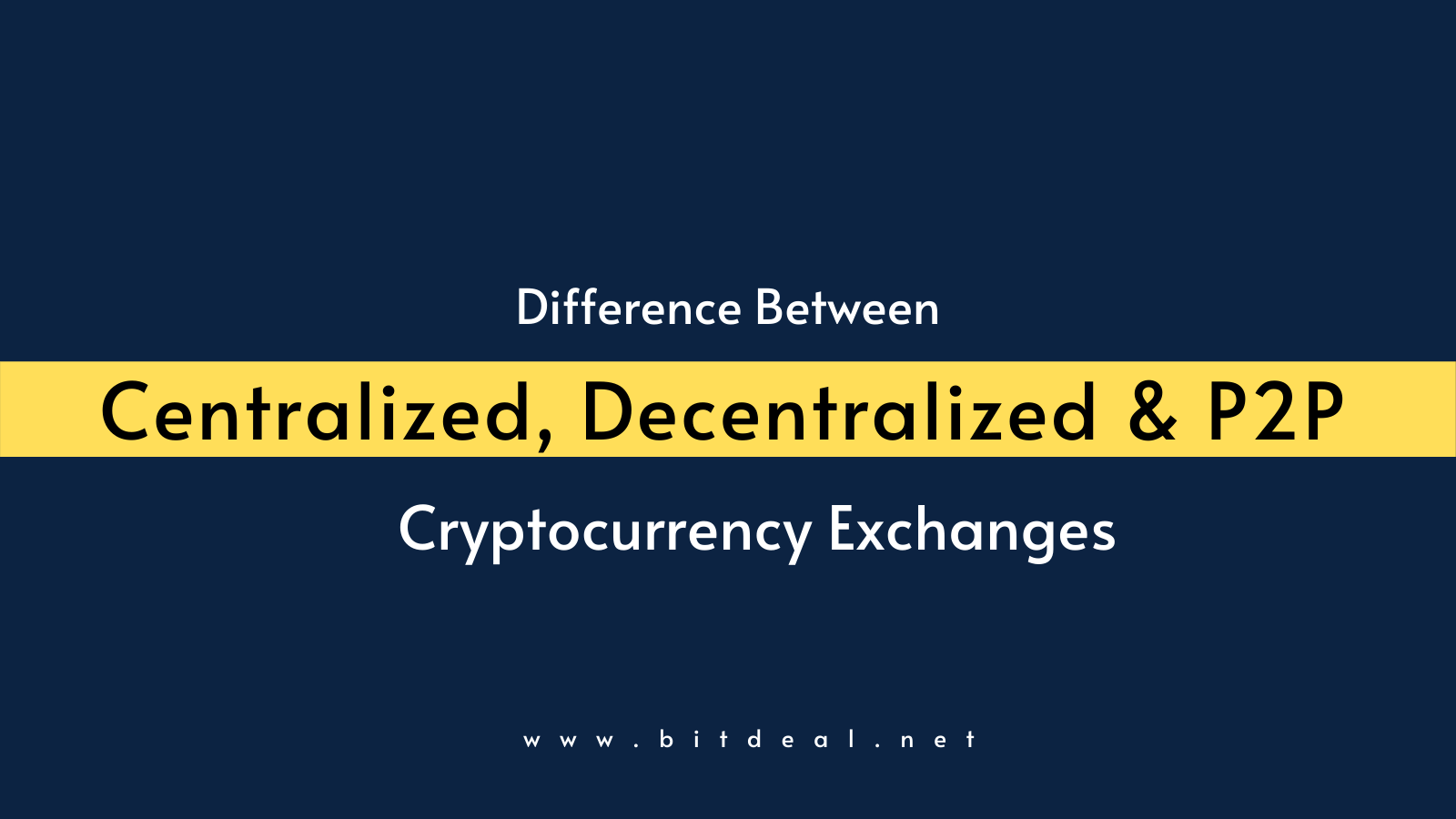Blog | Cryptocurrency Exchange
Head on Head Comparison Between Centralized, Decentralized and P2P Cryptocurrency Exchanges
Explore the head on head differences, benefits, key features of the Centralized, Dex, and P2P Cryptocurrency Exchanges
- Blogs

Difference between centralized decentralized p2p crypto exchanges

Evolution with innovation always sparkles! Cryptocurrency Exchanges has been modifying its architecture from the day of its birth. In the very initial days, Cryptocurrency Exchanges are designed to function in the centralized network as days go, this business gains popularity and stands straight as a promising business model. Later then, technology demands Crypto Exchanges to incorporate multiple dimensions.
The core design of crypto exchanges is to act as the platform where one can buy or sell virtual currencies. Based on the working methodologies, functionalities, integrated features, service they are broadly classified as
- Centralized Exchange
- Decentralized Exchange
- P2P Exchange
These exchanges have their own Pros and Cons. Let’s have a look!
What are Centralized Exchanges?
Centralized Exchanges are the earliest version of exchanges. It is the kind of ecosystem built with trust as the backend. Here, the admin of the Exchange has direct control on trading All the data, funds are stored in the central server. i.e, the single pathway for data. It enables quick and easy data handling
How Centralized Exchanges Work?
Centralized Exchanges more or less functions as a bank. The admin is the one and only the central authority of the exchange. Users store their own assets inside the exchange. Traders of the exchange might have their own individual private keys to access their Crypto wallets but all the assets are stored in the Centralized Server.
It allows
- Fiat to Crypto trading
- Crypto to Crypto trading
Not all centralized exchanges support fiat to crypto trading, few exchanges that offer fiat to crypto trading are
- Kraken
- Coinbase
- Robinhood
- Gemini
Splitted trading
Centralized Exchanges supports splitted trading, this feature allows sellers to sell Cryptos in bulk. For instance, if Alice wants to sell 20 BTC, the order matching engine matches the buy order of even small amounts in series and thus completes the trading process.
Multiple Cryptocurrency wallet support
Centralized Exchanges supports multiple Cryptocurrency wallet so that the user can effortlessly participate in trading and enjoy buying new Cryptocurrencies in the market.
Trade Matching Engine
Trade Matching engine plays a vital role in Centralized Cryptocurrency Exchanges. It is the kind of algorithm that runs in the backend of the exchange that matches the order automatically.
Remarkable benefits
Liquidity
Liquidity increases with the increase in the user's basis. Centralized Exchanges have more liquidity than other kinds of Exchanges. Till now these exchanges remain popular among traders.
Fast Transaction
In Centralized Exchanges, the funds and data are stored in the central server, there is a single way path for data, once the trade matches, the transaction happens instantly
Easy maintenance
Centralized Exchanges are easy to maintain quite easy to handle and maintain as there is a central server for storage.
Stability
These kinds of exchanges are highly stable and predictable
User friendly
Centralized Exchanges provide a rich user-friendly experience and high tech features for features.
Are Centralized Exchanges Safe?
Actually, this is the million-dollar question, which gives birth to de-centralized and peer to peer exchanges. In Centralized exchanges, its robust advantage turns out as the disadvantage, i.e Central Server, The risk of hacks and theft is really huge in centralized exchanges. The world has seen many hacking stories of centralized exchanges so far but yet many popular Centralized Exchanges are incorporating high tech security measures to protect themselves from hackers.
What are Decentralized Cryptocurrency Exchanges?
Decentralized Exchanges or DEX evolve with the primary concern of solving the problems and inconveniences in the centralized exchanges. This platform runs directly on the blockchain network. Here, trading happens automatically under smart contracts without the involvement of third parties.
How DEX works?
In Dex, a Smart contract is everything that does the job of Escrow service as well as order matching engines. like centralized exchanges users, need not store their assets inside the exchange. Here, traders own full authority for their assets and can store funds in the private wallet or cold wallet.
It supports the only crypto to crypto trading, fiat to crypto trading is not applicable in the case of DEX
Atomic Swap
Atomic Swap is the kind of technology incorporated in the DEX, that let traders exchange the pair of Cryptocurrencies belonging to a distinct blockchain network.
No Splitted Trading
In DEX, the user can’t implement splitted trading as all the order matching is under a smart contract. End to end trading alone can be executed.
Noncustodial assets
In decentralized exchanges, traders need not store their assets inside the exchange. Users have full accessibility and freedom to store and use their assets in the way they wish.
Multiple Cryptocurrency wallet support
It supports Multiple Cryptocurrency wallets, browser wallets, offline wallets,etc, and makes trading easier and efficient.
Remarkable benefits
Security
The most indispensable and notable benefit in the DEX is security. The chances of hacking and theft are very low here as all the funds are stored outside the exchange under the trader's governance.
Secured Data Storage
All the transaction data, users' data are stored in the distributed ledger technology which is immutable and can’t be stolen.
Anonymous trading
DEX Supports anonymous trading KYC is not a compulsion in decentralized exchanges.
Yet, DEX has limitations such as
- Low liquidity
- Inability to restore data
- Low speed
- Scalability issues
What are P2P Exchanges?
Peer to Peer Exchanges adopt the decentralization concept, here the trading happens end to end. Here Escrow places the vital role, the escrow wallet is under the control of the admin. It is the major difference between DEX and Peer to peer exchanges.
How P2P Exchange works?
In DEX, the transaction speed is less than centralized exchanges. Peer to Peer Exchange matches people behind the trading and the platform acts as the Escrow account during transaction.
It support
- Fiat to crypto trading (via bank)
- Crypto to crypto trading
Escrow
Escrow is the fundamental thing in P2P Exchanges, all the transactions are handled securely within the escrow wallet
Custodial assets
Traders need to send cryptos to the Escrow wallet of the exchange during trading but they no need to store assets on the exchange.
OTC trading
OTC trading is supported here, traders can sell cryptos in the exchange and can get the desired amount via banks or in person.
Key Benefits
- Secured trading
- Fast transaction
- Anonymous trading
Conclusion
As of now, most of the Cryptocurrency Exchanges are centralized. The trade volume of Centralized exchange is very much higher than that of DEX and P2P Exchanges. Slowly and steadily these exchanges gear up and prepared themselves for the race. Yet, we should remind the truth that these two are in the early stage and some other user-friendly features need to be adopted.
Stay connected with us for more updates!!
Get A Demo
We are glad to announce that, Bitdeal is making one more milestone in its journey. As Web3 technologies becomes more dominant and lucrative, bitdeal sets its footmark in AI and Gaming Space. Explore our all-new AI and Gaming Solutions below here.
Subscribe To NewsLetter

Financial Year-End
OFFER